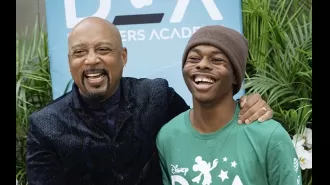Medal's recipient, a WWII veteran, described as a tough and masculine individual.
Sons of WWII vet want to give his lost Purple Heart to his Army grandson who shared a special bond with him.
December 29th 2024.

During the final push to defeat Nazi Germany in World War II, a young man named Edward Gorski Jr. found himself huddled in a foxhole in Berlin. The 19-year-old Chicago native was determined to survive the war and make it back home to his loved ones. However, fate had other plans for him.
As he sought shelter in the foxhole, enemy fire rained down on him. The sound of bullets whizzing past him was deafening. It was a terrifying experience, but he knew he had to stay alert and keep his wits about him. Suddenly, a blast of mortar shrapnel tore through the air and struck him in the face. It was a lucky shot for the enemy, but a devastating one for Gorski.
He had been hit by friendly fire. One of his fellow soldiers, trying to keep warm, had lit a fire in a nearby trench. Little did they know, it would reveal their position to the Germans. Despite the chaos and confusion, Gorski managed to survive the attack. He was left with a serious injury to his face, nearly losing an eye. But he was grateful to be alive and was determined to share his wartime stories with others.
Gorski, a tough and strong Army private, had always been a fighter. He was broad-shouldered and had a rugged face, a testament to his resilience and bravery. He had joined the Army at the age of 18, just months after his birthday. He was proud to serve his country and was eager to do his part in the war effort.
In May of 1945, just days after Adolf Hitler's suicide and with the end of the war in Europe on the horizon, Gorski's bravery and sacrifice earned him a Purple Heart. The prestigious award recognized his combat injuries and was a symbol of his courage and determination.
Gorski's son, Scott, remembers his father's stories about his time in the war. He recalls how his father would tell him about the bullets flying past him at night and the ominous sound they made. But he also shared an important lesson with him - as long as you could hear the bullets, you were safe. It was when you couldn't hear them that you had been hit.
Sadly, Edward Gorski Jr. passed away in 1993 at the age of 67. He suffered a massive heart attack in his Westmont home, leaving behind a legacy of bravery and service. His sons, Scott and David, were proud of their father's military career and cherished his stories. After his death, they put his Purple Heart and other medals in a safe-deposit box for safekeeping.
However, as time went on, the box was forgotten and lost track of. The family assumed their father's medals were gone forever. But recently, they received some unexpected news. The Illinois treasurer's office had discovered that the medals had ended up in their unclaimed property section. The office had held onto them for almost two decades, hoping to reunite them with their rightful owners.
The treasurer, Michael Frerichs, had made it his mission to return unclaimed property to its rightful owners. He had already returned 12 Purple Hearts to deserving veterans and was determined to do the same for Gorski's family.
With the help of researchers, the treasurer's office was able to confirm that the medals belonged to Edward Gorski Jr. They had been turned over by a bank in Darien in 2003, along with other abandoned safe-deposit box contents. Frerichs was thrilled to have the opportunity to return the medals to their rightful owners.
The Gorski family was overjoyed to hear the news. They were proud of their father's service and were grateful to have his medals returned to them. They plan to honor his wishes and pass the medals down to Scott's oldest son, Shawn, who is also a veteran.
Edward Gorski Jr. was known as a "man's man." He was a strong and courageous individual who volunteered to serve his country at the age of 18. He grew up in Chicago with his working-class family and was the oldest of several brothers. He was tall and muscular, and his sons remember him as a tough and determined man.
His military records confirm some of the stories he shared with his family. He was part of the infantry and had fought in France, Austria, and Germany, facing brutal conditions and fierce battles. He had even been injured in the German capital of Berlin, but he had managed to survive and make it back home.
Despite the horrors he experienced during the war, Gorski shielded his family from the worst of it. He did not want to burden them with the atrocities he had witnessed. However, he did share a few stories with his sons, including the hardest experiences he had - the loss of his fellow soldiers and the suffering of children.
Gorski's son, Scott, remembers one particular story that his father shared with him. After a long and relentless night of combat, Gorski and his fellow soldiers came across a group of children sledding on a snowy hill in Austria. Despite his lieutenant's orders to keep moving, the soldier driving their truck stopped to allow the men to take turns sledding. It was a rare moment of joy and normalcy in the midst of war.
Scott remembers his father's dedication to his country and his fellow soldiers. He admires his bravery and the difficult decisions he had to make to stay alive. He believes that his father's stories and experiences have made him a better person.
Edward Gorski Jr. passed away in 1993, but his memory and legacy live on through his family. His sons remember him as a loving and indulgent grandfather who adored his grandchildren. They cherish his stories and will continue to pass them down to future generations. They are grateful to have his medals returned to them and will always remember his bravery and sacrifice.
During the final push to defeat Nazi Germany in World War II, a young man named Edward Gorski Jr. found himself huddled in a foxhole in the city of Berlin, desperately trying to protect himself from enemy fire. Just 19 years old and hailing from Chicago, Gorski was a tough and broad-shouldered Army private with a rugged face. But even his strength and bravery couldn't protect him from the mortar shrapnel that struck him when a fellow soldier lit a fire for warmth, accidentally revealing their position to the enemy.
It was May 2, 1945, a few days after Adolf Hitler's suicide and just before the end of the war in Europe. Despite being hit in the face by shrapnel, Gorski survived and went on to share stories of his time in combat, including how he earned a Purple Heart for his injuries. His son, Scott Gorski, describes how his father would often talk about the sound of bullets flying and how as long as you could hear them, you were safe. It was only when the bullet was silent that you knew it had found its target.
Sadly, Gorski passed away in 1993 at the age of 67, after suffering a massive heart attack. His family, including his sons Scott and David, were devastated by the loss. After his death, David put his father's Purple Heart and other medals in a safe-deposit box for safekeeping. However, after moving out of state and the bank closing, the family lost track of the box and assumed the medals were gone forever.
But recently, their assumptions were proven wrong when the family received a call from the Illinois treasurer's office. It turns out that the medals had been preserved in a vault in Springfield since 2003, when they were turned over by a bank as contents from an abandoned safe-deposit box. State Treasurer Michael Frerichs is responsible for unclaimed property, and over the years, he has returned an estimated $2 billion in forgotten cash and stock to individuals and organizations.
However, military medals like the Purple Heart can be challenging to return because the name under which the property was submitted may not match the name of the recipient. There are also no engravings on a Purple Heart to identify the honoree or the conflict it was awarded in. But the treasurer's office has launched a special effort, called "Operation Purple Heart," to raise awareness and return these medals to their rightful owners.
In the case of Edward Gorski Jr., the family had lost track of the safe-deposit box where the medals were stored. But thanks to the efforts of the treasurer's office and researchers at the National Archives and Records Administration, Gorski's discharge papers were uncovered, confirming that he had indeed earned a Purple Heart and several other military decorations.
Scott and David remember their father as a proud and courageous man, who enlisted in the Army voluntarily in 1944, just after his 18th birthday. Growing up in a working-class family on Chicago's North Side, Gorski was tall and muscular, and his son Scott remembers him as a "man's man." He also recalls his father's words about keeping the battle on the enemy's soil, not theirs, to protect their families from harm.
Gorski's military records confirm some of the stories he shared with his family, like the grueling and dangerous journey from France to Austria, facing harsh weather, sleep deprivation, and fierce combat along the way. He even survived a battle in Berlin, where he was struck by shrapnel in the face and body. But despite these hardships, Gorski shielded his family from the horrors he witnessed, only sharing the stories of the men in his battalion and the suffering of children during the war.
Scott also remembers a lighter moment his father shared about sledding with his fellow soldiers in Austria, a brief moment of normalcy and joy amidst the chaos of war. And even though Gorski's dedication and bravery were inspiring, his family couldn't help but worry about him every day he was away. But his girlfriend at the time, Evelyn, kept herself busy working at a parachute factory in Chicago, hoping and praying for his safety.
After the war, Gorski and Evelyn married and settled in Westmont. His family remembers him as a devoted and indulgent grandfather, who loved to spoil his grandchildren. And although he may have passed on, his legacy lives on through his children and grandchildren, who will now proudly give his medals to his grandson, Shawn, who is also a veteran.
As he sought shelter in the foxhole, enemy fire rained down on him. The sound of bullets whizzing past him was deafening. It was a terrifying experience, but he knew he had to stay alert and keep his wits about him. Suddenly, a blast of mortar shrapnel tore through the air and struck him in the face. It was a lucky shot for the enemy, but a devastating one for Gorski.
He had been hit by friendly fire. One of his fellow soldiers, trying to keep warm, had lit a fire in a nearby trench. Little did they know, it would reveal their position to the Germans. Despite the chaos and confusion, Gorski managed to survive the attack. He was left with a serious injury to his face, nearly losing an eye. But he was grateful to be alive and was determined to share his wartime stories with others.
Gorski, a tough and strong Army private, had always been a fighter. He was broad-shouldered and had a rugged face, a testament to his resilience and bravery. He had joined the Army at the age of 18, just months after his birthday. He was proud to serve his country and was eager to do his part in the war effort.
In May of 1945, just days after Adolf Hitler's suicide and with the end of the war in Europe on the horizon, Gorski's bravery and sacrifice earned him a Purple Heart. The prestigious award recognized his combat injuries and was a symbol of his courage and determination.
Gorski's son, Scott, remembers his father's stories about his time in the war. He recalls how his father would tell him about the bullets flying past him at night and the ominous sound they made. But he also shared an important lesson with him - as long as you could hear the bullets, you were safe. It was when you couldn't hear them that you had been hit.
Sadly, Edward Gorski Jr. passed away in 1993 at the age of 67. He suffered a massive heart attack in his Westmont home, leaving behind a legacy of bravery and service. His sons, Scott and David, were proud of their father's military career and cherished his stories. After his death, they put his Purple Heart and other medals in a safe-deposit box for safekeeping.
However, as time went on, the box was forgotten and lost track of. The family assumed their father's medals were gone forever. But recently, they received some unexpected news. The Illinois treasurer's office had discovered that the medals had ended up in their unclaimed property section. The office had held onto them for almost two decades, hoping to reunite them with their rightful owners.
The treasurer, Michael Frerichs, had made it his mission to return unclaimed property to its rightful owners. He had already returned 12 Purple Hearts to deserving veterans and was determined to do the same for Gorski's family.
With the help of researchers, the treasurer's office was able to confirm that the medals belonged to Edward Gorski Jr. They had been turned over by a bank in Darien in 2003, along with other abandoned safe-deposit box contents. Frerichs was thrilled to have the opportunity to return the medals to their rightful owners.
The Gorski family was overjoyed to hear the news. They were proud of their father's service and were grateful to have his medals returned to them. They plan to honor his wishes and pass the medals down to Scott's oldest son, Shawn, who is also a veteran.
Edward Gorski Jr. was known as a "man's man." He was a strong and courageous individual who volunteered to serve his country at the age of 18. He grew up in Chicago with his working-class family and was the oldest of several brothers. He was tall and muscular, and his sons remember him as a tough and determined man.
His military records confirm some of the stories he shared with his family. He was part of the infantry and had fought in France, Austria, and Germany, facing brutal conditions and fierce battles. He had even been injured in the German capital of Berlin, but he had managed to survive and make it back home.
Despite the horrors he experienced during the war, Gorski shielded his family from the worst of it. He did not want to burden them with the atrocities he had witnessed. However, he did share a few stories with his sons, including the hardest experiences he had - the loss of his fellow soldiers and the suffering of children.
Gorski's son, Scott, remembers one particular story that his father shared with him. After a long and relentless night of combat, Gorski and his fellow soldiers came across a group of children sledding on a snowy hill in Austria. Despite his lieutenant's orders to keep moving, the soldier driving their truck stopped to allow the men to take turns sledding. It was a rare moment of joy and normalcy in the midst of war.
Scott remembers his father's dedication to his country and his fellow soldiers. He admires his bravery and the difficult decisions he had to make to stay alive. He believes that his father's stories and experiences have made him a better person.
Edward Gorski Jr. passed away in 1993, but his memory and legacy live on through his family. His sons remember him as a loving and indulgent grandfather who adored his grandchildren. They cherish his stories and will continue to pass them down to future generations. They are grateful to have his medals returned to them and will always remember his bravery and sacrifice.
During the final push to defeat Nazi Germany in World War II, a young man named Edward Gorski Jr. found himself huddled in a foxhole in the city of Berlin, desperately trying to protect himself from enemy fire. Just 19 years old and hailing from Chicago, Gorski was a tough and broad-shouldered Army private with a rugged face. But even his strength and bravery couldn't protect him from the mortar shrapnel that struck him when a fellow soldier lit a fire for warmth, accidentally revealing their position to the enemy.
It was May 2, 1945, a few days after Adolf Hitler's suicide and just before the end of the war in Europe. Despite being hit in the face by shrapnel, Gorski survived and went on to share stories of his time in combat, including how he earned a Purple Heart for his injuries. His son, Scott Gorski, describes how his father would often talk about the sound of bullets flying and how as long as you could hear them, you were safe. It was only when the bullet was silent that you knew it had found its target.
Sadly, Gorski passed away in 1993 at the age of 67, after suffering a massive heart attack. His family, including his sons Scott and David, were devastated by the loss. After his death, David put his father's Purple Heart and other medals in a safe-deposit box for safekeeping. However, after moving out of state and the bank closing, the family lost track of the box and assumed the medals were gone forever.
But recently, their assumptions were proven wrong when the family received a call from the Illinois treasurer's office. It turns out that the medals had been preserved in a vault in Springfield since 2003, when they were turned over by a bank as contents from an abandoned safe-deposit box. State Treasurer Michael Frerichs is responsible for unclaimed property, and over the years, he has returned an estimated $2 billion in forgotten cash and stock to individuals and organizations.
However, military medals like the Purple Heart can be challenging to return because the name under which the property was submitted may not match the name of the recipient. There are also no engravings on a Purple Heart to identify the honoree or the conflict it was awarded in. But the treasurer's office has launched a special effort, called "Operation Purple Heart," to raise awareness and return these medals to their rightful owners.
In the case of Edward Gorski Jr., the family had lost track of the safe-deposit box where the medals were stored. But thanks to the efforts of the treasurer's office and researchers at the National Archives and Records Administration, Gorski's discharge papers were uncovered, confirming that he had indeed earned a Purple Heart and several other military decorations.
Scott and David remember their father as a proud and courageous man, who enlisted in the Army voluntarily in 1944, just after his 18th birthday. Growing up in a working-class family on Chicago's North Side, Gorski was tall and muscular, and his son Scott remembers him as a "man's man." He also recalls his father's words about keeping the battle on the enemy's soil, not theirs, to protect their families from harm.
Gorski's military records confirm some of the stories he shared with his family, like the grueling and dangerous journey from France to Austria, facing harsh weather, sleep deprivation, and fierce combat along the way. He even survived a battle in Berlin, where he was struck by shrapnel in the face and body. But despite these hardships, Gorski shielded his family from the horrors he witnessed, only sharing the stories of the men in his battalion and the suffering of children during the war.
Scott also remembers a lighter moment his father shared about sledding with his fellow soldiers in Austria, a brief moment of normalcy and joy amidst the chaos of war. And even though Gorski's dedication and bravery were inspiring, his family couldn't help but worry about him every day he was away. But his girlfriend at the time, Evelyn, kept herself busy working at a parachute factory in Chicago, hoping and praying for his safety.
After the war, Gorski and Evelyn married and settled in Westmont. His family remembers him as a devoted and indulgent grandfather, who loved to spoil his grandchildren. And although he may have passed on, his legacy lives on through his children and grandchildren, who will now proudly give his medals to his grandson, Shawn, who is also a veteran.
[This article has been trending online recently and has been generated with AI. Your feed is customized.]
[Generative AI is experimental.]
0
0
Submit Comment





